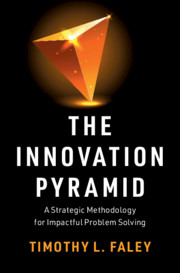Book contents
- The Innovation Pyramid
- The Innovation Pyramid
- Copyright page
- Dedication
- Contents
- Figures
- 1 Introduction
- Part I Innovation Design and Execution
- 2 Introduction to The Innovation Pyramid
- 3 Level 1
- 4 Level 2
- 5 Level 3
- 6 Level 4
- 7 Systematic Pyramid Review
- Part II The Diverge–Organize–Converge Process
- Book part
- Bibliography
- Index
2 - Introduction to The Innovation Pyramid
from Part I - Innovation Design and Execution
Published online by Cambridge University Press: 30 December 2020
- The Innovation Pyramid
- The Innovation Pyramid
- Copyright page
- Dedication
- Contents
- Figures
- 1 Introduction
- Part I Innovation Design and Execution
- 2 Introduction to The Innovation Pyramid
- 3 Level 1
- 4 Level 2
- 5 Level 3
- 6 Level 4
- 7 Systematic Pyramid Review
- Part II The Diverge–Organize–Converge Process
- Book part
- Bibliography
- Index
Summary
The Innovation Pyramid is an inverted triangular pyramid. The methodology for creating impactful solutions to real problems separates the innovation's design from its execution. It further bifurcates design into identifying the real problem before crafting a solution to it. Execution is similarly bifurcated into execution planning and implementation. The four stacked levels of The Innovation Pyramid, from top to bottom, represent Problem Identification, Solution Formulation, Planning and Implementation; two design stages followed by two execution stages. The Pyramid has three faces. These three pyramid sections address three different aspects of designing and executing impactful solutions:
What: What is the desired outcome at that level?
How: How will this be accomplished or enabled?
Who: Who will lead the activities and/or is impacted by the outcome of this level?
This structure streamlines innovation creation as well as providing a structural means for diagnosing the cause of the variance between the actual and forecasted impact of the innovation. This diagnostic aspect is especially important when we may be traversing The Innovation Pyramid structure multiple times, once for say, prototype development, and a second time for the final product launch.
Keywords
- Type
- Chapter
- Information
- The Innovation PyramidA Strategic Methodology for Impactful Problem Solving, pp. 23 - 40Publisher: Cambridge University PressPrint publication year: 2021

